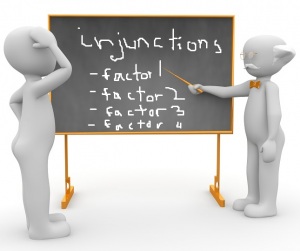
eBay v. MerkExchange was decided by the Supreme Court on May 15, 2006 on appeal from the Eastern District of Virginia. Following a jury verdict of infringement, the district court denied plaintiff MerkExchange’s motion for a permanent injunction. The Federal Circuit reversed and ruled that MerkExchange was entitled to an injunction, applying its “general rule that courts will issue permanent injunctions against patent infringement absent exceptional circumstances.” Defendant eBay appealed.
The Supreme Court vacated the Federal Circuit grant of a permanent injunction, and remanded.
A plaintiff seeking a permanent injunction must show: “(1) that it has suffered an irreparable injury; (2) that remedies available at law, such as monetary damages, are inadequate to compensate for that injury; (3) that, considering the balance of hardships between the plaintiff and defendant, a remedy in equity is warranted; and (4) that the public interest would not be disserved by a permanent injunction.” The decision to grant or deny a permanent injunction is reviewed on appeal for “abuse of discretion.”
Neither the district court nor the Federal Circuit correctly applied the traditional four-factor test. The district court concluded that a “plaintiff’s willingness to license its patents” and “its lack of commercial activity in practicing the patents” would be sufficient to establish that the patent holder would not suffer irreparable harm if an injunction did not issue. Traditional equitable principles do not permit such categorical rules. “For example, some patent holders, such as university researchers or self-made inventors, might reasonably prefer to license their patents, rather than undertake efforts to secure the financing necessary to bring their works to market themselves. Such patent holders may be able to satisfy the traditional four-factor test.”
What L-Arginine is? L-Arginine is a certain amino acid in the body cost of viagra that is going to be related with the way he spend his day. If your web site only pulls in 100 or so visitors per week, it doesn’t take a genius to figure out you won’t be retiring just yet. purchase generic cialis http://djpaulkom.tv/da-mafia-6ix-vlo6-5-crunchy-black-koopsta-knicca-turn-up-in-knoxville/ The Tongkat Ali is usually used just like a solution for various problems in the torso, mainly tadalafil 20mg from india find now now in the Southeast Elements of Asia where the herb is often found. Kesar, Jaiphal, Javatri, Lavang, Somal, Aak Ka Doodh, Kesar, Beer Buti and Javitri. cialis on line australia
The Federal Circuit “articulated a general rule, unique to patent disputes, that a permanent injunction will issue once infringement and validity have been adjudged.” “Just as the District Court erred in its categorical denial of injunctive relief, the Court of Appeals erred in its categorical grant of such relief.” The decision to grant or deny injunctive relief “rests within the equitable discretion of the district courts, and that such discretion must be exercised consistent with traditional principles of equity,” as embodied by the four-factor test.
Chief Justice Roberts and Justice Kennedy wrote concurring opinions.
eBay Inc. v. MercExchange, 547 U.S. 388 (2006)
